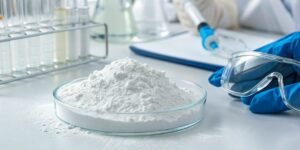
Choosing the right metal for a project is a critical decision. Pick the wrong one, and you could end up with a product that is too heavy, rusts quickly, or is too expensive to produce.
Aluminum’s primary advantages are its high strength-to-weight ratio, excellent corrosion resistance, and superior formability. It is also a great thermal and electrical conductor and is infinitely recyclable without losing its quality, making it a uniquely versatile and sustainable choice.

In my work at an aluminum hydroxide production1 plant, I’m involved at the very start of the aluminum journey. I’ve learned that the true strength of aluminum isn’t just one single quality, but the powerful combination of all its properties. This synergy is what allows engineers to use it in everything from spacecraft to soda cans. It’s not always about a single feature, but about the total value it brings to a product.
Why is aluminum better than other metals?
Many metals force you to make a compromise. You can have strength, but it comes with heavy weight. You can have light weight, but the material is weak and expensive.
Aluminum is often better because it offers a balanced set of properties without major compromises. Its high strength-to-weight ratio and natural rust resistance mean you get durable performance in a lightweight package.

The most famous advantage of aluminum is its ability to be both light and strong. This is a game-changer. Steel is very strong, but it is also very heavy. For any application where movement is involved, like a car or a plane, that extra weight means more fuel and lower performance. This is where aluminum offers a superior solution. An aluminum alloy can be engineered to have the strength needed for structural parts but at only one-third the weight of steel. This single fact drastically improves efficiency and capability. In addition, aluminum naturally creates its own protective oxide layer, so it doesn’t rust away like steel. This means products last longer and require less maintenance, especially outdoors.
What are the advantages of aluminium metal?
Beyond being light and strong, what else can aluminum do? Limiting your view to only those two properties means you miss out on a whole range of design and performance benefits.
The main advantages of aluminum metal include its excellent formability, high thermal and electrical conductivity, and its status as one of the most sustainable materials due to its recyclability. It is also non-toxic and reflective.

From a manufacturing standpoint, how you can shape a material is just as important as its inherent properties. Aluminum excels here. It is a very ductile and malleable metal2, which means it can be easily formed into a huge variety of shapes. It can be rolled into foil thinner than a human hair, cast into complex engine blocks, or extruded into incredibly intricate profiles for window frames and heat sinks. This design freedom is a huge advantage.
| Advantage | Description | Common Use |
|---|---|---|
| Formability | Can be easily extruded, rolled, cast, and machined. | Window frames, beverage cans, car body panels. |
| Conductivity | Excellent conductor of heat and electricity. | High-voltage power lines, cookware, heat exchangers. |
| Recyclability | 100% recyclable. Saves 95% of the energy vs. primary production. | All aluminum products, especially beverage cans. |
| Reflectivity | Reflects both heat and light very well. | Emergency blankets, roofing, light fixtures. |
The recyclability is especially important. Because it can be recycled forever without losing quality, aluminum is a key part of the modern circular economy.
What are the advantages and disadvantages of aluminum?
No material is perfect for every single job. Claiming aluminum is always the best choice is not realistic. A balanced view is needed to avoid misapplication and potential design flaws.
Aluminum’s key advantages are its low density, corrosion resistance, and formability. Its main disadvantages are a lower absolute strength than high-grade steel, lower stiffness, and a higher initial cost per ton.

Being honest about a material’s limitations is crucial for making good engineering decisions. At our factory, we provide very specific grades of aluminum hydroxide because our customers need precise properties. The same is true for the final metal.
A Balanced View
| Advantages | Disadvantages |
|---|---|
| High Strength-to-Weight Ratio | Lower Absolute Strength than Steel |
| Excellent Corrosion Resistance | Higher Thermal Expansion |
| High Thermal & Electrical Conductivity | Lower Hardness and Wear Resistance |
| Excellent Formability & Machinability | Higher Initial Cost per Ton |
| Infinitely Recyclable | Lower Fatigue Strength |
While steel is stronger in a simple head-to-head pull test, the story changes when weight is considered. For stiffness, a part made of aluminum needs to be designed differently, often thicker, to achieve the same rigidity as steel, but it will still be lighter overall. The higher initial cost per ton3 for aluminum is also often misleading. Because it is so much lighter, you get more material volume for the same weight. When you add the fact that aluminum doesn’t need painting or coating to prevent rust, the total lifetime cost can often be much lower than steel.
What are the advantages of aluminum over steel?
It is the most common comparison in the industry: aluminum versus steel. Looking only at the price per kilogram is a classic mistake that can lead to a heavy, inefficient, and rust-prone final product.
Aluminum’s two greatest advantages over steel are its density and its corrosion resistance. An aluminum part will weigh about one-third of an identical steel part, and it will not rust, eliminating the need for costly coatings and maintenance.

Having worked on the production side, I appreciate direct, an apples-to-apples comparison. When you put these two metals side-by-side, the choice becomes very clear for many applications.
Direct Comparison: Aluminum vs. Carbon Steel
| Feature | Aluminum | Steel |
|---|---|---|
| Density (Weight) | Low (~2.7 g/cm³) | High (~7.85 g/cm³) |
| Strength-to-Weight | Very High | Medium |
| Corrosion Resistance | Excellent (self-protecting) | Poor (rusts easily) |
| Formability | Excellent | Good |
| Cost per Ton | Higher | Lower |
The cost per ton is the most deceptive figure here. You are buying weight, not volume. Since aluminum is nearly three times lighter, a ton of aluminum gives you three times more raw material by volume. For many projects, this equalizes the cost. But the real savings come from performance and lifetime value. A lighter vehicle saves fuel for its entire life. An aluminum structure that does not need to be painted every few years saves huge amounts of money on maintenance. For these reasons, aluminum is not just a replacement for steel; it’s an upgrade.
Conclusion
Aluminum’s unique blend of light weight, strength, corrosion resistance, and formability gives it a clear advantage over other metals in a vast range of applications, delivering superior performance and long-term value.
You may also be interested in:

What Key Technical Indicators Should Be Considered When Purchasing Aluminum Hydroxide?
Are you struggling to find the right aluminum hydroxide for your needs? You might be paying for features you don’t even require. Let’s simplify the technical details. When buying aluminum

What are the market trends for aluminum hydroxide in 2026?
Are you planning your 2026 raw material purchases? Volatile markets make it hard. I will share insights from the factory floor to help you make better decisions for your business.

Is aluminum hydroxide toxic and is it harmful to the human body?
Worried about the word "aluminum" in your products? It sounds scary and can make you question its safety. I’m here to clear up the confusion with simple facts. Aluminum hydroxide

What are the side effects of long-term use of stomach medications containing aluminum hydroxide?
Struggling with constant heartburn? Reaching for that stomach medicine might seem like the only option. But what if that relief comes with hidden long-term costs? The most common side effect

Does ingesting aluminum (such as through aluminum hydroxide) cause Alzheimer's disease?
Are you worried that everyday products containing aluminum might be harmful? This fear connects to serious health concerns like Alzheimer’s, making you question what is safe. Let’s look closely. Based

Why do some vaccines contain aluminum hydroxide (aluminum adjuvant)?
Confused about vaccine ingredients? Seeing aluminum hydroxide listed can be unsettling. I’ll explain its crucial role and why it’s there to help your body build strong immunity. Aluminum hydroxide acts

Is the aluminum adjuvant in vaccines safe for infants or adults?
You read about vaccine ingredients and worry. The word "aluminum" sounds scary, especially when talking about babies. But understanding the facts can give you peace of mind. Yes, the aluminum

What environmental problems are generated during the production of aluminum hydroxide?
Worried about environmental compliance in your supply chain? Sourcing from China can be complex. You need a reliable, eco-conscious partner for your aluminum hydroxide needs. The main environmental issue is

Where are China's main aluminum hydroxide production areas?
Are you struggling to find the right aluminum hydroxide supplier in China? This confusion can lead to higher costs and unstable quality, which hurts your business and your reputation. China’s

What is the difference between aluminum hydroxide and aluminum oxide, and how can they be converted into each other?
Are you confused by aluminum hydroxide and aluminum oxide? They look similar but have very different uses. Understanding them helps you buy the right material and save money. The main